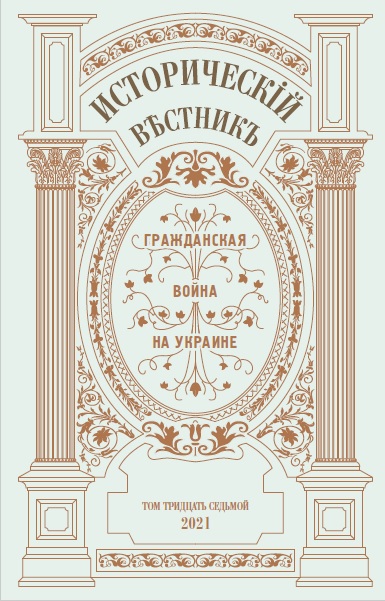
Пацовский А.П., Пацовский Я.А. Гражданская война 1654–1667 гг. на Украине: историографические мифы и реальность
Пацовский А. П., Пацовский Я. А. Гражданская война 1654–1667 гг. на Украине: историографические мифы и реальность // Исторический вестник. 2021. Т. ХXХVII. С. 250–269.
Аннотация
В статье раскрываются причины, основные события и итоги гражданской войны в Малороссии (1657–1687) гг., получившей народное название “Руина”. В советский период данные события практически не освещались, по причине их неоднозначности и нежелания вносить разлад между исторически предопределенным братством наших народов. В российской истории такая тенденция продолжилась. Пользуясь этим, современные русофобски настроенные украинские историки стали истолковывать наше невнимание к этим событиям, как попытку замалчивания наиболее неудобных и спорных периодов нашей совместной истории.
Итак, после Переяславской рады Московское царство оказалось втянутым в кровопролитную войну с Речью Посполитой, Крымским ханством, и, несколько позже, с Османской империей. Война с Речью Посполитой длилась 13 лет и закончилась, уже после смерти Богдана Хмельницкого, подписанием Андрусовского соглашения по которому Малороссия была разделена на Левобережную и Правобережную части. Гражданская война полыхала и после подписания мира с поляками. Потребовалось более 30 лет, чтобы относительное спокойствие наконец восстановилось. При этом, если на Левобережье люди едва сводили концы с концами, то Правобережная часть Украины превратилась в полностью выжженную безлюдную территорию, разоренную крымским ханом и янычарскими ортами. Не осталось целым ни одного сколь угодно малого городка или местечка. Остатки населения, ввиду невозможности защитить их, были принудительно выведены на Левобережье.
Ключевые слова: Руина, Малороссия, Левобережье, Запорожская Сечь.
Пацовский Александр Петрович – кандидат технических наук, доцент, Санкт-Петербургский государственный технологический институт (технический университет) (СПбГТИ (ТУ).
Пацовский Ярослав Александрович – учащийся (Санкт-Петербург).
***
Patsovsky A. P., Patsovsky Y. A.The Ruin. Lessons of History // Historical Reporter. Vol. 37. 2021. P. 250–269.
Abstract
This article brings to light the reasons, key events and the results of the 1657–1687 Civil War in Ukraine, also known as the Ruin. There was hardly any coverage of these events during the Soviet period due to their ambiguity and the unwillingness to disrupt the historical brotherhood of Russia and Ukraine. This trend has continued in Russian history. Contemporary anti-Russian historians from Ukraine have been taking advantage of that: they interpret the lack of attention to those events as an attempt to hush up the most unwanted and controversial periods of the countries' shared history.
After thePereyaslav Council, the Tsardom of Russiawas drawn into a bloody war with the Polish-Lithuanian Commonwealth, the Crimean Khanate and, shortly after, the Ottoman Empire. The war with the Polish-Lithuanian Commonwealth lasted 13 years and ended after the death of Bohdan Khmelnytskywith the Truce of Andrusovo, which separated Left-bank Ukraine from Right-bank Ukraine. The Civil War continued after the truce was established. It took more than 30 years to restore relative calm. Moreover, while people on the left bank could hardly make ends meet, Right-bank Ukraine was turned into a scorched, depopulated territory, devastated by the Crimean Khan and Janissary ortas. Not a single town or village was spared. As there was no way to protect the remaining population, they were all forced to move to the left bank.
Key words: The Ruin, Ukraine, Left-bank Ukraine, TheZaporozhian Sich.
Alexander P. Patsovsky— Candidate of Technical Sciences, Associate Professor, Saint-Petersburg State Institute of Technology (Technical University).
Yaroslav A. Patsovsky — student (Saint Petersburg).
***
References
-
Babulin I.B. «Wild dances» on Konotop field: Yakov Krotov Library-access Mode: http://krotov.info/libr_min/02_b/ab/ulin2.htm, free / (Date of application: 21.02.2017).
-
Babulin I.B. «Belgorod regiment March to Ukraine in autumn 1658» // Unicorn. Materials on the military history of Eastern Europe during the Middle ages and Early Modern times. M., 2009. Vol. 1.
-
Golenchenko G. «Gentry democracy» in the Grand Duchy of Lithuania (XVI–XVIII centuries) // Belarus and Russia: society and state. Mn., 1998. V. 2.
-
Kostomarov N.I. Russian history in the lives of its main figures. M.: Eksmo, 2007.
-
Novoselsky A.A. the Struggle of the Moscow state with the Tatars in the second half of the XVII century // Novoselsky A.A. Research on the history of feudalism (scientific heritage). M., 1994. P. 68.
-
Maltsev A.N. The First stage of the Russian-Polish war for the liberation of Ukraine and Belarus (1654–1656) // Essays on the history of the USSR. The period of feudalism, XVII century / Ed. A.A. Novoselsky and N.V. Ustyugov. M., 1955.
-
Maltsev A.N. Continuation and completion of the Russian-Polish war (1658–1667). Andrusov truce // Essays on the history of the USSR. The period of feudalism, XVII century / Ed. A.A. Novoselsky and N.V. Ustyugov. M., 1955.
-
Patsovsky A.P. Ruin: a historical poem / Ed. I.N. Sitnikov. Ryazan: Publisher Sitnikov, 2018. 608 p.
-
Reunification of Ukraine with Russia, documents and materials in three volumes. M., 1953. T. III. P. 413–414, 567–570.
-
Soloviev S.M. History of Russia since ancient times: Materials of Russian history. Access mode: <http://www.kulichki.com//gusary/istoriya /> polish/vasilev/, free (Date of application: 21.02.2017).
-
Under the banner of Russia: a Collection of archival documents. M.: Russian book, 1992.
-
Yevtushenko V.F. An Essay on the history of the little Russian Cossacks: the Server of modern literature «Samizdat». Access mode: http://samlib.ru/e/evtushenko_walerij_fedorovich/ kazaki.html, free (Date of application: 21.02.2017).
-
Zaruba V.M. Administrative-territorial structure and administration of Zaporizhzhya army (1648–1782) / Dnepropetrovsk state University of internal Affairs. Dnepropetrovsk, 2007. 233 p.

